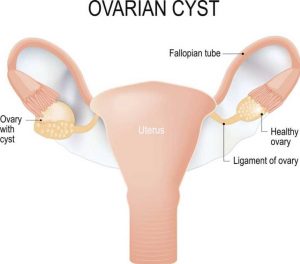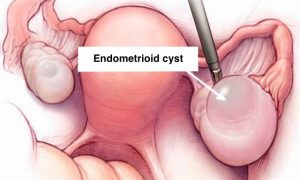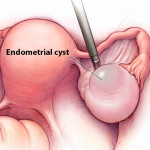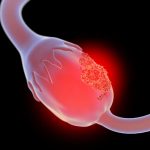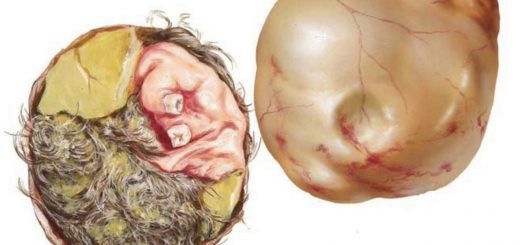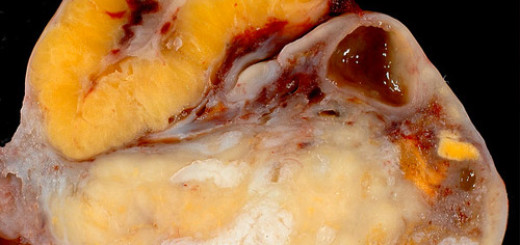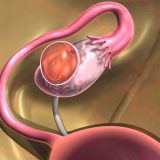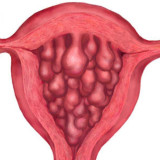Ovarian cyst is a formation in the tissues of the appendages. It’s a pathology and it looks like a camera filled with liquid secretion. If you are experiencing pain in the ovary, then you shouldn’t engage in self-diagnosis. You urgently need to contact your doctor. An increase in the formation due to fluid secretion causes pain in the testicle, a pronounced aching, severe and cutting pain in the lower abdomen.
Today we look at the main causes of pain in an ovarian cyst, how dangerous it’s and what to do with severe pain in the right groin.
Why ovarian cyst is dangerous?
Many women rarely worry about their disease in the early stages due to the absence of symptoms. However, as the disease progresses, the cyst increases due to volumes of fluid secretion. For this reason, there are many violations of the reproductive system of the female body. The main danger is the development of complications, which requires urgent intervention by doctors.
Complications may occur due to the rapid proliferation of cysts. It begins to put pressure on the adjacent internal organs, interfering with their full-fledged work. There is a risk of rupture of the cyst capsule. This can lead to liquid secretion in the abdominal cavity, which leads to the development of peritonitis (inflammation of the peritoneum). Also, an ovarian cyst may be mobile due to the stem on the basis of the formation. There is a risk that it may twist and begin to decompose. During this process, the woman feels a sharp pain in her right groin.
Causes and nature of ovarian cyst pain
Pain in the ovarian cyst differ in different levels of intensity. They depend on the structure of the cyst, where it is located and how fast it grows.
With the growth of the wrist formation, a woman has severe pain in the right groin and the accompanying symptoms:
- Violation of the menstrual cycle;
- Isolation of blood in the intervals between menstruations;
- Feeling of heaviness in the lower abdomen;
- Feeling of discomfort and pain during intercourse;
- Difficulties in urinating;
- Violation of the process of bowel movements;
- Pain in the side during light physical exertion;
- In severe cases: fever, emetic urge, fainting.
Can a breast ache if a woman has an ovarian cyst?
Gynecologists say that some cysts are hormone-dependent. They can cause breast hypersensitivity in the period preceding ovulation. This is often manifested for women diagnosed with corpus luteum cyst.
Which pain in the right groin is noticed by women who have an ovarian cyst?
- Cyst of the yellow body. With this disease, woman feels a slight pain in her right groin. It appears periodically and causes only mild discomfort. Also, patients note that sometimes they have breast pains (most often during the ovulation period);
- A dermoid cyst (teratoma) is a complex of germinal tissues that should have been involved in the formation of other organs, but for some reason fell into the ovary. Cyst regularly provokes severe and intense pain. The cause of the pain is the size of the carpal mass. Often teratoma grows so large that it begins to put pressure on the tissue of nearby organs;
- Mucinous cysts. Such a cystic formation provokes severe pain transmitted to the groin and thigh due to the rapid growth of a benign tumor;
- Endometrioid cyst – abdominal formation on the surface of the ovary. A cyst looks like an accumulation of menstrual blood in a sheath of endometrial cells. With a benign education, a woman has cramps in the lower abdomen and groin. The proper functioning of the intestines is impaired, leading to constipation;
- Paraovarian cysts – formations that are formed from the epididymis. Causes pain in the lower abdomen and lower back
In which areas you might feel pain, when you diagnosed with the ovarian cyst:
- The area of the groin, from which the pain goes into the upper thigh;
- Loin;
- Sacral area;
- Rectum
What you can do with pain in the right groin and general deterioration?
When a woman with an ovarian cyst experiences severe pain, she needs to pay attention to it. If the doctor has established a type of cyst and says that it is not so dangerous, then you shouldn’t relax. Periodic pain causes severe discomfort and must be dealt with:
- Create conditions for complete rest (lie down on a sofa or bed for a few minutes, the pain will gradually pass);
- Put a hot-water bottle on your belly (it will help relieve cramps);
- Take a bath. Water should be warm (in no case hot). Heat will help relieve pain in the right groin;
- Take painkillers.
Remember that you cannot choose every painkillers. Before you buy medicine, be sure to consult your doctor. Each formation has its own characteristic types of pain. This helps the specialist to understand what kind of formation is in your case. With constant use of painkillers, you complicate the task of the doctor. There is a risk to miss the moment of disease progression.
The elimination of pain in the ovarian cyst with a warm bath or heating pad can only be done if an accurate diagnosis is determined. The doctor must be sure that such recommendations will not start the process of growth of benign education.
Remember that heat helps relax and relieve muscle cramps in the abdomen and groin.
What if the pain in the ovary becomes intense and affects the general condition of the woman?
If that home treatment doesn’t help to improve health condition, then you should carefully monitor your symptoms. Growth of a cyst will only harm your health and can lead to serious consequences.
What should cause you concern:
- Pain in the right groin increases, becomes very painful and pulsating. Pain occurs even with minimal activity;
- The patient limits herself in her actions to dull the pain in her right groin;
- There is a visual asymmetry in the lower abdomen: one of the sides begins to increase in size;
- There is a sharp deterioration in health: the body temperature rises, a feeling of great weakness, dizziness and fainting.
In the presence of any of the signs is considered an indication for emergency hospitalization of the patient. Doctors urgently need to take measures to assist the woman.
How to understand that there was a twisting of the cyst stem or rupture of the cystic capsule?
- A woman has a sharp attack of pain that paralyzes the whole body;
- Abrupt abdominal swelling (may be caused by bleeding);
- A sharp drop in blood pressure;
- Fainting, constant dizziness;
- Vomiting;
- Pallor of the skin of a woman
In the presence of any of the signs is considered an indication for emergency hospitalization of the patient. Doctors urgently need to take measures to assist the woman. If you do not provide assistance in a timely manner, then the appearance of next diseases is possible: blood poisoning, peritonitis, severe blood loss.
Related Posts
